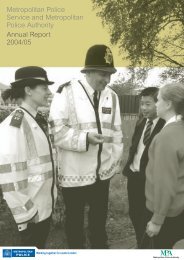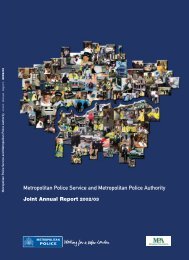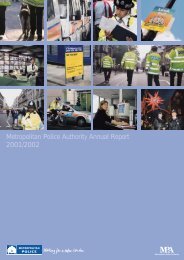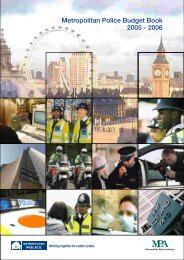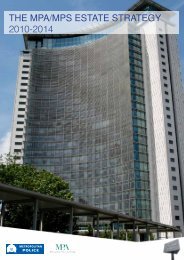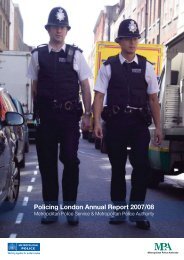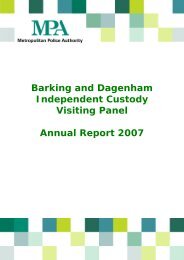Minutes of this meeting
Minutes of this meeting
Minutes of this meeting
You also want an ePaper? Increase the reach of your titles
YUMPU automatically turns print PDFs into web optimized ePapers that Google loves.
It was commented that although the agreement is a MPS piece there is a<br />
relationship on a national level as well. The review may take two months or longer to<br />
complete.<br />
2. MARAC will be the model rolled out across the MPS. They are working with the<br />
CSUDI and other partners in the voluntary sector to be inline with the National<br />
Model. The London Criminal Justice Board is now committed to rolling it out,<br />
however it should be noted that <strong>this</strong> is a multi agency model and not necessarily<br />
police driven. Those boroughs who are close enough to running a MARAC model will<br />
receive funding from the Home Office. Training is an issue. Diana Barran from<br />
CAADA will speak to the CSUDIs to ensure consistency in training. Cost is an issue<br />
as funding from the Home Office is not going to cover the entire exercise. Would a<br />
MARAC model save more lives than the current model that is in place even though it<br />
is not a pure MARAC model? The comment was made that models that are not pure<br />
MARAC are less cost effective. It was suggested that the cost issue is almost a red<br />
herring as there are tremendous savings to be made through a MARAC by reducing<br />
repeat victimisation. We need to be clear that boroughs should be working with a<br />
MARAC model and also how much local autonomy they have when working with it.<br />
The police in some boroughs feel that Social Services should be more involved in<br />
the process and chairing the MARAC. It is about competence, training and<br />
commitment. A good Chair is needed, regardless if they are from the MPS or not.<br />
Guidance is available on how to run a MARAC and has been disseminated through<br />
the CSUDI <strong>meeting</strong>s and is also available on the website. Training is the main cost<br />
involved in a MARAC.<br />
3. Cindy repeated her request that Tower Hamlets give the board a clearer<br />
understanding <strong>of</strong> what action is being taken around community engagement and<br />
how it relates to DV crime. ACTION: MPS<br />
4. Yasmin said the LSJB audit has been conducted and the responses are being<br />
collated. A paper should be ready for circulation by the next <strong>meeting</strong>. ACTION: MPS<br />
5. The <strong>meeting</strong> between Anni Marjoram and Lee Jasper to discuss disproportionality<br />
will have to be moved forward because we are still awaiting the report. ACTION: Anni & Lee<br />
6. Gerry said there have been issues around the quality <strong>of</strong> MET Call as a first<br />
response. Domestic calls are allocated an ‘I’ (Immediate) grade in line with MPS<br />
standard operating procedure. However, does <strong>this</strong> mean that a DV I call will be at the<br />
top <strong>of</strong> the priority list for an individual <strong>of</strong>ficer? It depends on what information they<br />
then receive from dispatch. Is the generic training sufficient? The SOP looks fit for<br />
purpose however the operational reality may be different. There is a GOLD group<br />
<strong>this</strong> issue could be referred to. Cindy said <strong>this</strong> issue has been raised as a real<br />
concern. The board would like to know if training is sufficient and if there is room for<br />
improvement. Anni said that the training is not working. Although it may be fit for<br />
purpose, it is perhaps being given to <strong>of</strong>ficers who do not have the right attitude to DV<br />
crime. Gerry agreed there is probably more work to do within call centres. ACTION:<br />
3


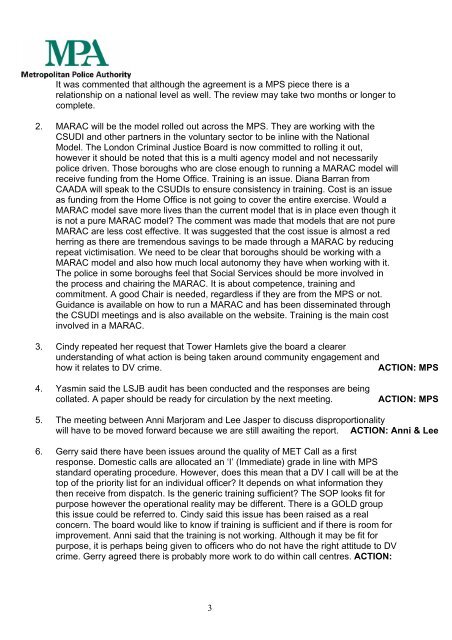
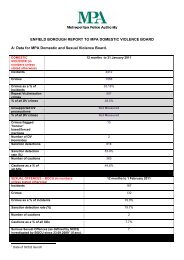
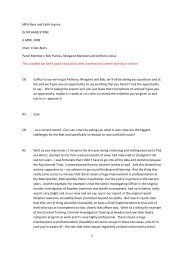
![Appendix 1 [PDF]](https://img.yumpu.com/51078997/1/184x260/appendix-1-pdf.jpg?quality=85)
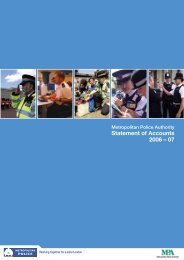
![Transcript of this meeting [PDF]](https://img.yumpu.com/50087310/1/184x260/transcript-of-this-meeting-pdf.jpg?quality=85)
![Street drinking in Hounslow [PDF]](https://img.yumpu.com/49411456/1/184x260/street-drinking-in-hounslow-pdf.jpg?quality=85)
